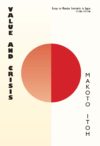
Value and Crisis: Essays on Marxian Economics in Japan, second edition
Marxist economic thought has had a long and distinguished history in Japan, dating back to the First World War. When interest in Marxist theory was virtually nonexistent in the United States, rival schools of thought in Japan emerged, and brilliant debates took place on Marx’s Capital and on capitalism as it was developing in Japan. Forty years ago, Makoto Itoh’s Value and Crisis began to chronicle these Japanese contributions to Marxist theory, discussing in particular views on Marx’s theories of value and crisis, and problems of Marx’s theory of market value. Now, in a second edition of his book, Itoh deepens his study of Marx’s theories of value and crisis, as an essential reference point from which to analyze the multiple crises that have arisen during the past four decades of neoliberalism. The promise of Marx’s theories has not waned. If anything—given the failure of Soviet-style socialism and the catastrophe of neoliberalism—it grows daily. | more…